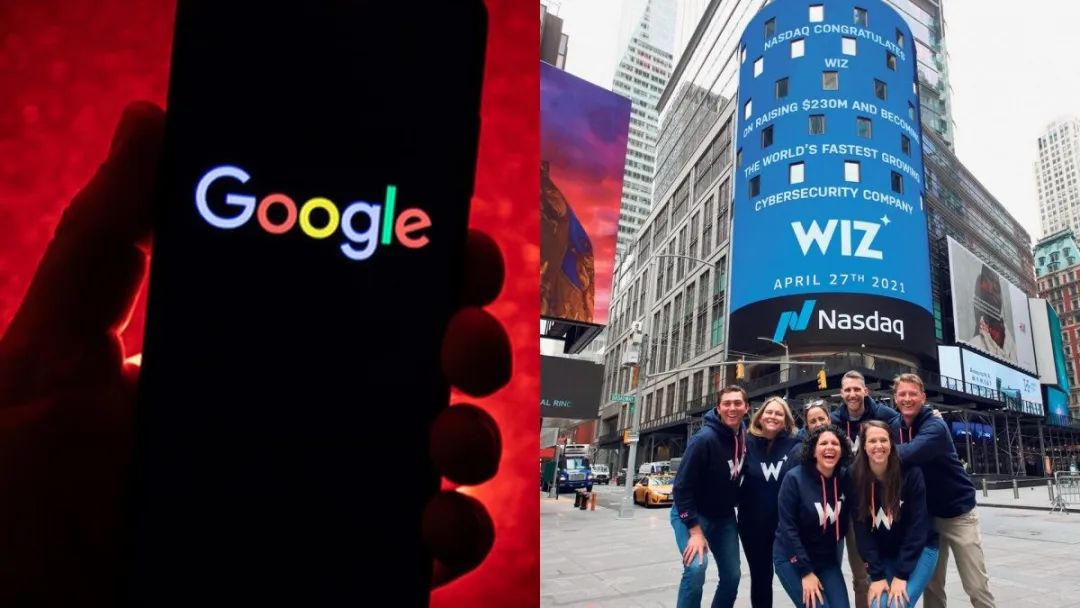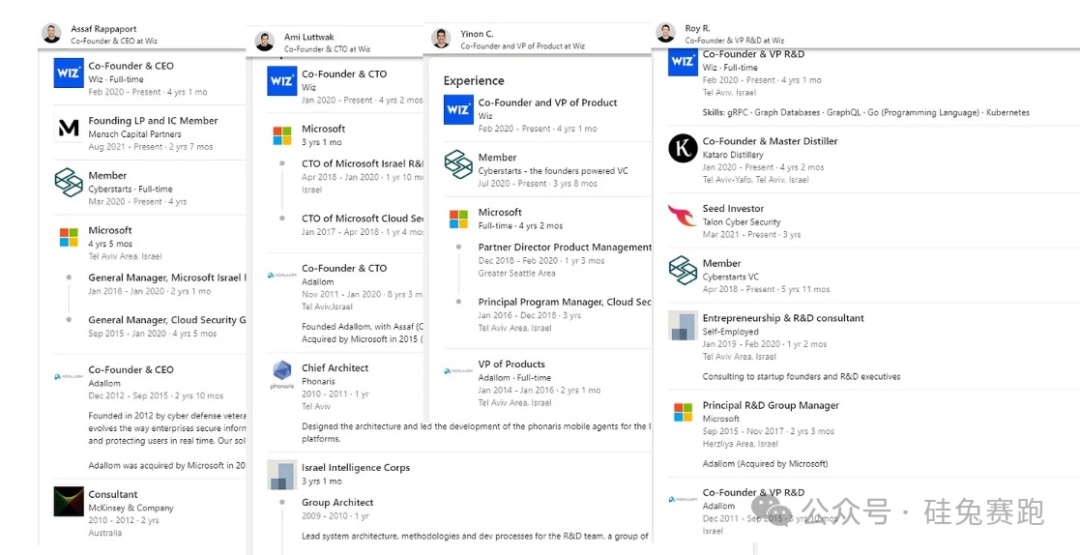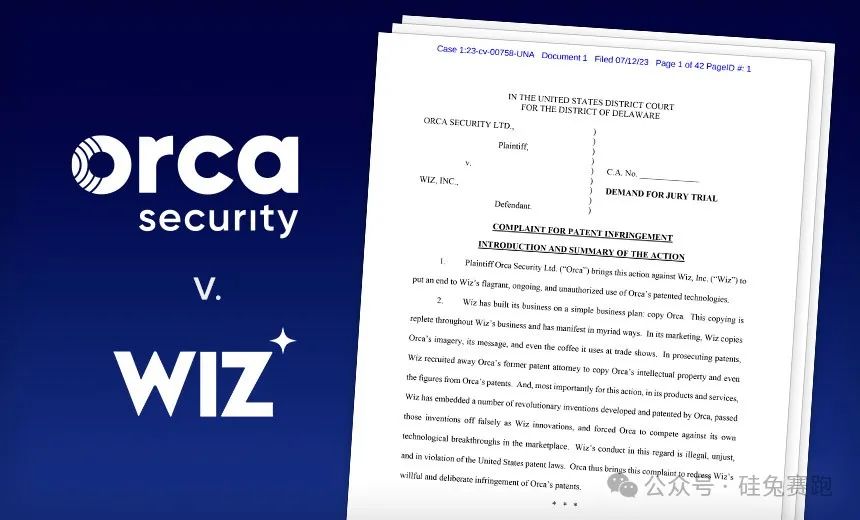Refusing Google's $23 Billion Acquisition Offer, What Makes 4-Year-Old Wiz so Confident?
![]() 07/24 2024
07/24 2024
![]() 689
689

“
Rejecting acquisition for IPO, Wiz's ambition goes beyond Google.
”
As technological dividends surge, so do technological risks. For cybersecurity professionals, these risks are their "dividends." So, how big is this "dividend" now? We can glimpse the answer from the growth of Wiz, a cybersecurity startup.
Since its inception, Wiz has raised nearly $2 billion in funding, with the following funding milestones:
March 2021: Completed a $130 million funding round led by Advent International and Greenoaks Capital.
May 2021: Salesforce, Blackstone, including Bernard Arnault and Howard Schultz, invested $120 million, raising Wiz's valuation to about $2 billion.
October 2021: Existing investors such as Insight and Greenoaks invested another $250 million, bringing Wiz's valuation to $6 billion.
February 2023: Raised $300 million in Series D funding led by Lightspeed Venture Partners and Greenoaks Capital Partners, with a post-money valuation of approximately $10 billion.
May 2024: Completed a $1 billion Series E funding round, valued at $12 billion, co-invested by renowned institutions including a16z, Greylock, Index Ventures, Salesforce Ventures Impact Fund, Thrive Capital, and Sequoia Capital.
Five days ago, according to foreign media reports, Google's parent company was in talks with Wiz to acquire it for approximately $23 billion.
However, the story took a turn yesterday (July 23rd), when Wiz CEO Assaf Rappaport announced in a memo to employees that Wiz had rejected Google's acquisition offer. At the same time, he stated that Wiz's next goal was to achieve $1 billion in ARR and pursue an IPO.
This news from Wiz was like a thunderbolt.

Image source: Forbes
01
Elite Founding Team
Before understanding why this company is worth so much, let's first look at what the security industry is experiencing, or rather, what AI has brought to the security industry.
According to Gartner, the cloud computing market has reached a massive $500 billion and is expanding rapidly at over 20% annually. The emergence of ChatGPT and large models has further accelerated the cloud adoption process for enterprises, as they need to upload vast datasets to the cloud to train these models.
More data, connections, networks, and cloud services mean more complexity. Ensuring the security of these cloud assets has become an increasingly urgent priority and challenge. McKinsey recently reported that global organizations spend up to $200 billion on cybersecurity, while data breaches continue to increase, with estimated losses reaching $20 trillion by 2025 (that's trillions with a "T"!).
Against this backdrop, Wiz emerged. Unlike other cloud security companies, the Wiz founding team aimed from the start to create a game-changing cloud security product, a disruptive innovation rather than incremental improvements. This is closely related to the team's impressive backgrounds.
Wiz has four co-founders: Assaf Rappaport (CEO), Amy Luttwak (CTO), Roy Reznik (VP of R&D), and Yinon Costica (VP of Product). They all served in Unit 8200, Israel's elite intelligence unit.

From left to right: Assaf Rappaport, Ami Luttwak, Yinon Costica, and Roy Reznik
Image source: CTech
In the security sector, Unit 8200 is a name at the top of the "food chain."
Israel is a global leader in security technology, and Unit 8200 boasts some of the brightest minds in cyber intelligence worldwide. As of December 2023, alumni of Unit 8200 have founded over 1,000 security-related startups, including major cybersecurity companies like Check Point Software and Palo Alto Networks.
After leaving the unit, the four Wiz founders co-founded Adallom, a cybersecurity technology company. Adallom was sold to Microsoft for $320 million in 2015, and they subsequently joined Microsoft: Rappaport became the General Manager of Microsoft Israel, Costica became the Chief Program Manager for Cloud Security, Reznik became the Chief R&D Group Manager, and Luttwak became the CTO of Microsoft's Cloud Security Group.
02
Market Gap Opportunity
"If it can't serve hundreds of millions of users, we'd rather not do it."
It was at Microsoft that the four founders noticed a significant market gap: with the advent of AI, existing security solutions designed for on-premises networks could no longer meet the growing demand for cloud security. Security teams urgently needed a unified tool to manage and monitor all cloud servers.
The security industry has developed many security and scanning tools, but most are tailored for the "old world" of dedicated data centers and are fragmented.
So, when the Wiz team set out to solve cloud security issues, they didn't rush to launch a product but instead took the time to understand the needs of end-users (security professionals).
Through in-depth discussions with various teams, they further discovered that the core of cloud security issues wasn't the lack of a specific feature but the need to update the entire security operation model. They explored a cloud-native, single management platform that could help security personnel achieve unified management and protection, regardless of which cloud service provider's platform the infrastructure was deployed on.

Image source: Wiz
Meanwhile, the team applied the product-building insights they gained at Microsoft to Wiz's product development, with two key principles: 1) Always start with the user's actual needs and prioritize developing truly essential features; 2) Pursue extreme scalability. If a feature can't serve hundreds of millions of users, they'd rather not develop it.
To adhere to the first principle and understand users' true needs, the Wiz team engaged in extensive conversations with security developers. They didn't limit themselves to budget-approving departments, recognizing that in security, there can be significant differences between these departments and the developers actually responsible for security work.
After developing its cloud security solution, Wiz focused its core customer base on large enterprises that needed to manage complex and valuable cloud infrastructures.
On the one hand, these enterprises have more user data, correspondingly more security budgets, larger security teams (Wiz's users), and more pressing security issues. On the other hand, they face more complex external public opinion pressures and security regulatory requirements.
Their cloud environments are like skyscrapers in the real world, and Wiz's solution, with a unified interface, helps them prioritize and identify unlocked doors and windows, ensuring the security of corporate data and assets. More importantly, the Wiz team understands and meets these customers' needs.
With precise product positioning and a deep understanding of customer needs, Wiz successfully attracted world-renowned companies like Salesforce, BMW, Slack, LVMH, Morgan Stanley, and Bridgewater Associates. In just 18 months, it achieved $100 million in annual recurring revenue, demonstrating the market competitiveness and customer recognition of its solutions. 30% of Fortune 500 companies have adopted Wiz.

Some of Wiz's partner companies | Image source: Contrary Search
As of March 2024, Wiz has protected 5 million cloud workloads, scanning 230 billion files daily, with customers across various industries, including media, health, retail, travel, education, technology, and energy.
As the company's CTO Luttwak said, "If you ask me what I'm most proud of at Wiz, it's that developers can log in to Wiz and solve real problems. That's true user stickiness, the true market measure."
03
Will the Next Wiz Emerge?
By now, it's clear that Wiz's rapid rise is no accident, and a startup team of this caliber is difficult to replicate globally.
This team not only has a profound understanding and insight into the cybersecurity market but also has at least a decade of experience in this field. They have proven their strength and ability by successfully building a large enterprise in the cybersecurity industry.

More importantly, Wiz has access to the world's largest companies, selling its products to them, further proving the competitiveness and market recognition of its solutions.
With great success in the customer market, Wiz grew from 40 to over 400 employees in two years.
In December last year, Wiz spent approximately $400 million to acquire cloud threat detection and response platform Gem Security and cloud-based developer collaboration platform Raftt. In April this year, foreign media reported that Wiz was in talks with Lacework, a security company offering large-scale automated cloud security technology, whose latest market valuation reached $8.3 billion. However, according to insiders, this acquisition failed after due diligence.
Moreover, Wiz boasts a strong network of international investors and has no shortage of funds. Correspondingly, its funding pace is also very intense, with almost one funding round every 3-6 months since its inception. Before Wiz had any customers, it first raised a $20 million seed funding round. Subsequently, Index Ventures and Insight Partners, early supporters of Adallom (the team's first company), led an $80 million Series A funding round, pushing Wiz's valuation to $400 million.
Entering 2021, Wiz's growth momentum continued. In March, the company completed a $130 million funding round led by Advent International and Greenoaks Capital. Just two months later, renowned investors such as Salesforce and Blackstone, along with individual investors like Bernard Arnault of LVMH and Howard Schultz of Starbucks, invested another $120 million, raising the valuation of this one-year-old company to $2 billion. Notably, the investments from the founders of these consumer giants highlight Wiz's unique position and significant potential in the SaaS sector.
In October of the same year, thanks to an additional $250 million investment from Insight Partners, Greenoaks Capital, and other insiders, Wiz's valuation soared to $6 billion.
In August 2022, 18 months after its launch, Wiz achieved the milestone of becoming the fastest software company to reach $100 million in annual recurring revenue.
Company CEO Assaf Rappaport stated publicly that Wiz would eventually go public in the US, but there is no current pressure to do so. From Rappaport's interview, it's evident that Wiz is determined to go public, foreshadowing Google's failed acquisition attempt.
Wiz's current achievements are indeed remarkable, reflecting the market's urgent demand for innovative cloud security solutions. However, Wiz also faces negative pressures commonly encountered by star unicorns, such as patent disputes.Last year, Israeli cloud security service Orca Security filed a lawsuit against Wiz, accusing Wiz of patent infringement and mimicking marketing strategies, among other issues. For this four-year-old company, this is a test it must face on its growth path.

Image source: BankInfoSecurity
From an industry perspective, Wiz is not the only player in the cloud security boom. Statistically, there are now over 50 cybersecurity startups worldwide valued at over $1 billion, many of them cloud security players, with Wiz leading the pack. The rapid rise of these companies reminds us that talking about "shifting to the cloud" in 2024 seems somewhat outdated, given that this trend started over a decade ago. However, the vast potential of cloud computing remains largely untapped.
As enterprises continue to expand their cloud environments and adopt more advanced tools, the demand for cloud security grows accordingly. The cloud security market is expected to grow at a CAGR of 9.1% from $40.7 billion in 2023 to $62.9 billion in 2028. Key growth drivers include the proliferation of multi-cloud environments, the application of AI and machine learning in cloud security, and more.
In this rapidly growing field, Wiz has proven itself a force to be reckoned with, but the market competition is far from over.








